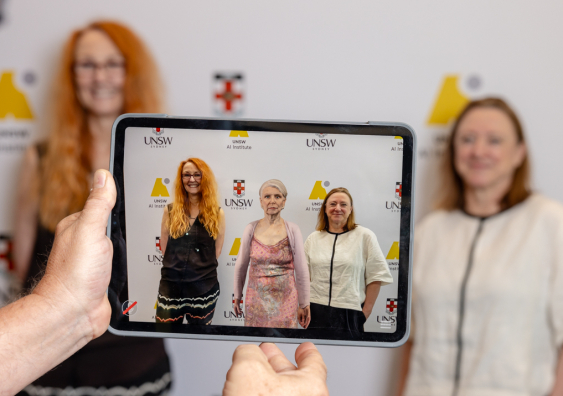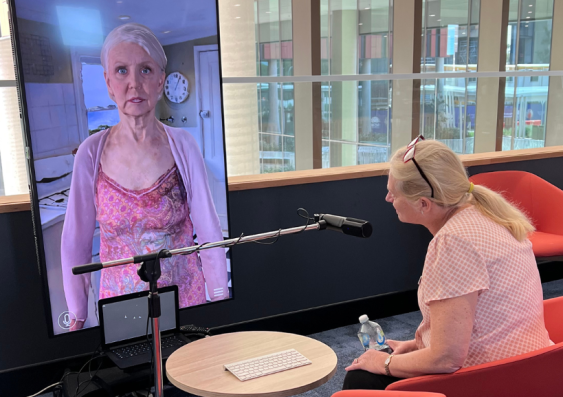Meet Viv: an AI character fostering companionship for people with dementia
With a view to improving the lives of people living with dementia, ╠╜╗¿╧╡┴╨ researchers have come up with a world-first: an AI driven companion.
With a view to improving the lives of people living with dementia, ╠╜╗¿╧╡┴╨ researchers have come up with a world-first: an AI driven companion.

Samantha Dunn
╠╜╗¿╧╡┴╨ Arts Design & Architecture News & Content Coordinator
0414 924 364
samantha.dunn@unsw.edu.au
Viv is candid about the ΓÇ£rollercoasterΓÇ¥ of living with dementia. She speaks gently. ΓÇ£It can be confusing and disorienting and at times downright scary, but there are also beautiful moments of connection and joy amidst the challenges,ΓÇ¥ she says.
“Those moments of connection … They are truly precious. You see even though my memory may fail me at times, the heart remembers.”
. It is a growing issue in health and aged care in Australia that has significant impact on quality of life for people living with dementia and for their family and friends.
VivΓÇÖs experience reflects that of many people living with dementia with one significant difference. Viv is an artificially intelligent (AI) character. She is part of a suite of digital characters being developed by the fEEL ARC Laureate Lab at ╠╜╗¿╧╡┴╨ Sydney to foster companionship for people living with dementia.
“Viv and Friends was co-created with women living with dementia – using their words, insights and experiences – to empathically understand the experience of dementia diagnosis and living with hallucinations,” says Dr Gail Kenning, a lead researcher from fEEL. Dr Kenning’s research examines how creativity can support health and wellbeing, with a particular focus on ageing and dementia.
ΓÇ£Like the women who co-created her, Viv experiences various dementia-related symptoms. She is insightful and reflective, finding her way in the world, living her life and coming to terms with neurological change.
ΓÇ£The companion characters can talk peer to peer about dementia or because theyΓÇÖre AI-driven, they can be programmed to share a personΓÇÖs interests. So, Viv could talk to them about gardening, for example,ΓÇ¥ she says. ΓÇ£They can also help calm people if they are overstimulated or emotionally dysregulated or motivate them if they are feeling apathetic.ΓÇ¥

ΓÇ£The companion characters can talk peer to peer about dementia,ΓÇ¥ says Dr Kenning. ΓÇ£They can also help calm people if they are overstimulated or emotionally dysregulated.ΓÇ¥ Photo: Courtesy of fEEL 2023.
Co-designing arts-based interventions with and for people with lived experience is central to the fEEL LabΓÇÖs ethos. Led by ARC Laureate Scientia Professor Jill Bennett, it brings together specialists in immersive media, participatory design, trauma studies and psychology to explore the embodied subjective experiences of trauma and ageing.
Viv first came to life as a digital character based on four women with similar symptoms of vascular dementia.
“Originally, she was an audio-visual artwork who helped people understand dementia by drawing them into her story. And then she became a teaching tool for professionals working with people with dementia. And, now using AI character engine technology, like that developed for game design, Viv can interact with people in real-time,” says Prof. Bennett.
Read more: 
The Viv and Friends series, co-designed by fEEL research fellow Volker Kuchelmeister, builds on the kinds of connections we forge with characters on television series, Dr Kenning says. ΓÇ£Research has shown that people can develop socio-emotional bonds with characters that can affect their moods and behaviours in much the same way as direct, interpersonal contact can,ΓÇ¥ she says.
However, the fast pace and complex storylines of television can prove an obstacle for people living with dementia, she says. ΓÇ£Viv and Friends speak slowly, they are patient and unfazed by repetitious conversations, allowing people living with dementia to easily engage.ΓÇ¥
While person-to-person contact is ideal, many people living in aged care have limited opportunities for social connection, she says. The companion characters are designed to enable meaningful communication and connection and help to combat feelings of isolation and loneliness through the simple pleasure of sharing a conversation or having a laugh.
“The characters don’t just provide companionship, they can also help with co-regulating emotion, as would happen with a human companion,” says Prof. Bennett. “This is very helpful when people living with dementia experience confusion or hallucinations. One potential positive effect we envisage is in terms of offering a calming and soothing response when people are anxious or distressed. Without a calming or reassuring companion people may simply be offered sedating medication. This is a big window to provide the kind of emotional support that can help people manage anxiety through a relationship with an AI companion.”
And while some people express concern that the characters are being created to replace human relationships, that could never be the case, says Prof. Bennett. “They could never replace relationships people have with their children, or spouses. But they could do things your son or daughter isn’t present to do or doesn’t have the patience to do. And you could ask them questions or say things to them you would never say to your kids, a function many might appreciate.”
Dr Kenning is currently taking Viv into a number of aged-care centres – both on a life-sized portrait screen and on iPads – to continue to explore ways Viv can be part of providing psycho-social support for those living with dementia.
ΓÇ£As screens are already available in both common spaces and private rooms in aged-care facilities, Viv will be well positioned to interact with the people living there,ΓÇ¥ says Dr Kenning.
ΓÇ£We will continue to develop Viv in the context of the space, including looking at ways that she can ground people in the moment within the rhythms of life in aged care, letting people know when itΓÇÖs time for tea, or a meal, and the like,ΓÇ¥ says Dr Kenning.
Previously the focus on AI in aged care has been personalisation, but more recent research suggests that whatΓÇÖs important is a sense of connection.
ΓÇ£VivΓÇÖs ability to respond or join in a conversation is a powerful psycho-social support, and we are now starting the process of creating a male character, and others to expand the potential of Viv and Friends to improve the lives of those living with dementia,ΓÇ¥ says Dr Kenning.
The fEEL team is currently working on characters that engage with mental and neurological health, focusing on ageing and trauma.